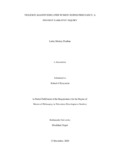
Please use this identifier to cite or link to this item:
https://hdl.handle.net/20.500.14301/464| Title: | VIOLENCE AGAINST EDUCATED WOMEN DURING PREGNANCY: A FEMINIST NARRATIVE INQUIRY |
| Authors: | Pradhan, Latika Maskey |
| Citation: | Pradhan, L.M.(2020).Violence against educated women during pregnancy: A feminist narrative inquiry |
| Issue Date: | 13-Dec-2020 |
| Publisher: | Kathmandu University School of Education |
| School: | SOED |
| Department: | DODE |
| Level: | M.Phil. |
| Program: | MPhil in Development Studies |
| Abstract: | The prevalence of violence against women is widespread, one in three women worldwide and two in ten women in Nepal experience violence in their lifetime. While violence can be in a different form, the international declarations recognize violence against women to be a result of historically situated unequal position of women in the society that are discriminatory for women. However, available studies on violence against women mostly focuses on exploring prevalence, forms of violence and its health consequences, that are often binary, and adopts a problem solving approach. There are limited researches that focuses on violence during pregnancy in Nepal that attempts to understand the underlying gendered narrative to the women’s individual experiences and normalization of violence. Thus, this research aims to explore how educated women explain and interpret their experience of violence, and its resistance or acceptance, with special reference to the period of their pregnancy. Drawing on the Focauldian theory of power and normalization, the study has employed feminist narrative inquiry as a method of research in reference to the framework introduced by Cladinin (2016) and Woodiwiss (2017). The feminist narrative inquiry is adopted to provide a critical lens in identifying the complexity and layers within the stories told. Further, the analysis adopts the standpoint epistemology, in acknowledging women’s account of the incidences of violence, not only as a mere narration, but as a unique knowledge in the given context. To enrich the discussion, a journey mapping exercise was employed to understand the temporality and context, of how the participants understood violence over their pregnancy period. Furthermore, the normalization of violence within the context of self, family and community is explained using the socio-ecological model in reference to, the dominant narrative. The study reveals some important accounts of women’s experiences of violence during pregnancy that ranges from anger, to workload and even work-place violence. Further, the analysis brings some critical discussion points, such as the role of educational values vis- a -vis violence; the condition of pregnancy in reference to women’s vulnerability; the pressure in the workplace to prove equal, and also the normalization of violence. Acknowledging the individual uniqueness, this research also reflects on the similarities in the experiences, and influence of the underlying social norms in reinforcing women’s subordination, even amongst the educated women. This study has implications at the policy, individual and behavioral level, and also raises questions for future researches. This study tells the stories of educated women’s experiences of violence during pregnancy, and reveals that the underlying gendered social norms and values continue to reinforce the women’s unequal positioning in society, thus, normalizing violence regardless of the educational status and agency of a woman. |
| URI: | https://hdl.handle.net/20.500.14301/464 |
| Appears in Collections: | Dissertations |
Files in This Item:
| File | Description | Size | Format | |
|---|---|---|---|---|
| Final dissertation_Latika Maskey Pradhan_Violence against educated women during pregnancy_ 17Dec 2020 (1).pdf | 1.21 MB | Adobe PDF |  View/Open |
Items in DSpace are protected by copyright, with all rights reserved, unless otherwise indicated.